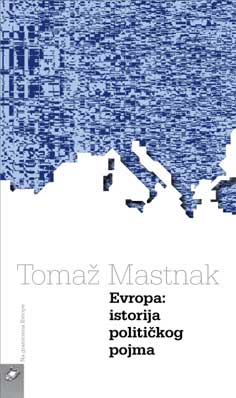
We kindly inform you that, as long as the subject affiliation of our 300.000+ articles is in progress, you might get unsufficient or no results on your third level or second level search. In this case, please broaden your search criteria.

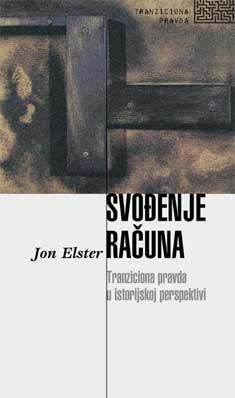
This book offers an analysis of transitional justice - retribution and reparation after a change of political regime - from Athens in the fifth century BC to the present
More...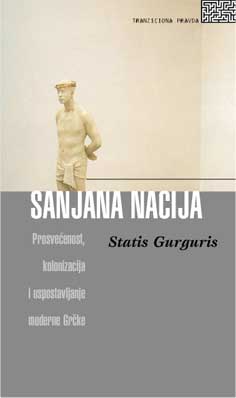
Against the backdrop of ever-increasing nationalist violence during the last decade of the twentieth century, this book challenges standard analyses of nation formation by elaborating on the nation’s dream-like hold over the modern social imagination. The author argues that the national fantasy lies at the core of the Enlightenment imaginary, embodying its central paradox: the intertwining of anthropological universality with the primacy of a cultural ideal. Crucial to the operation of this paradox and fundamental in its ambiguity is the figure of Greece, the universal alibi and cultural predicate behind national-cultural consolidation throughout colonialist Europe. The largely unpredictable institution of a modern Greek nation in 1830 undoes the interweaving of Enlightenment and Philhellenism, whose centrifugal strands continue to unravel the certainty of European history, down to the current internal predicaments of the European Community or the tragedy of the Balkan conflicts.
More...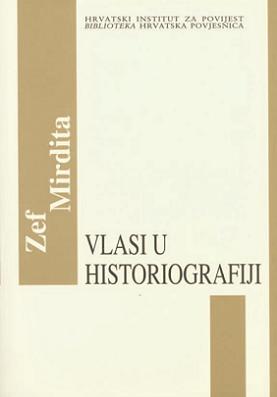
Much has been written on and discussed about the Balkan nation of Vlachs. Despite that, they have remained a historical mystery of the Mediterranean region and even wider. The reason for this is the fact that Vlachs (also called Cincars) do not have a defined ethnic and political area. They also do not have their particular cultural, educational and spiritual institutions. Historical research of Vlachs gave often conflicting results and these researches are the subject of this book. The author has treated the subject chronologically because Vlachs appeared very early in the multiethnic region of Balkan. Accordingly the book is divided into following chapters: “Vlachs in the works of Byzantine writers”, “Vlachs in the Turkish historiography”, “Vlachs in the medieval Latin chronicles, Imperial and Papal letters”. The author has also made a general cultural and geographical division - Vlachs in Balkan historiographies and Vlachs in Western historiographies including, as a separate chapter, Vlachs in Russian historiography.
More...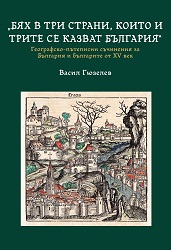
The present anthology comprises translations of 47 works (travel notes and log books, geography accounts, itineraries, portolans, treatises, sermons, novels and a variety of others); they are made up of either detailed or concise reports dealing with the Bulgarian lands and their inhabitants during the fifteenth century. They are the works of authors of various affiliations in terms of ethnicity, religious denomination or nationality (Arab, Bulgarian, Byzantine, French, German, Hungarian, Italian, Russian, Serbian, Spanish ones, etc.) They are meant to draw out an image of the state of affairs in the Bulgarian lands, as well as of the general state of the Bulgarians during the century in question, and also supplement and add up to the details listed in the papers and historical records pertinent to the period mentioned being of paramount importance in view to the Bulgarian history. They clearly and unequivocally show that during that period of time, the recollections over the Bulgarians and their nation had as of yet been clear and very much alive not only in the minds of many, but also distinct to almost all of Europe. Meanwhile, the details they feature provide for a clarification of the way of life of the Bulgarian people in the first few decades it had under the sway of a foreign rule, their part partaking not only to their history, but to the ones of the Balkans and Europe. The selected works of the remarkable medieval Bulgarian writers from that century, such as Constantine of Kostenets and Vladislav the Grammarian, stand out from the rest in the anthology. Their geographical and travel notes to a large extent account for the vigour of the Bulgarian national creative zest displayed in the course of a grievous century from the Bulgarian history. Brief notes on the certain authors and their works publications have been added to each and every translation of the particular sources. The written commentary with the particular texts is concise and relates a purposive information. A considerable portion of the texts comprised in the respective anthology has for the first time been brought to the knowledge of the reading party in Bulgaria. In a great measure, it is what would determine their significance as tools for a further scientific research.
More...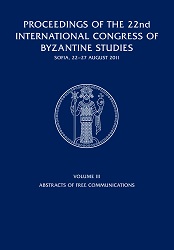
The present volume contains a diverse collection of more than 500 abstracts of free communications and posters presented at the 22nd International Congress of Byzantine Studies. As readers will realize, the forty Congress sessions have been constructed so as to include eminent scholars with substantial experience along with young and upcoming researchers striving to establish themselves in their respective fields. The arrangement of the abstracts follows the structure of the Congress program as put together under the supervision of Vassil Gjuzelev, President of the Organizing Committee. Considerable assistance, during his visit to Sofia in early April 2011, was also provided by Peter Schreiner, President of the International Association for Byzantine Studies, to whom we extend our sincere gratitude. The title of each session is prefixed by the letters FC (“Free Communications”) followed by the number of the respective session. The texts are reproduced with minimal editorial amendments and reflect the personal style and preferences of their authors.
More...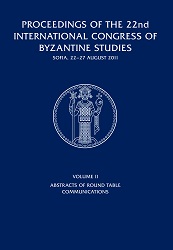
In the initial stages of preparation for the 22nd International Congress of Byzantine Studies, the Organizing Committee consulted with the National Committees. Out of those consultations there emerged the five main themes around which the roundtable discussions have been constructed. These are: Philology, Palaeography, Codicology; Archaeology and History; History of Art and Music; Theology and Philosophy; Economy, Politics, Urban Life. From the themes proposed there emerged thirty-nine round-table sessions. Nearly five hundred scholars from all over the world have so far submitted the abstracts for their papers to be discussed in the round-table sessions. The abstracts are presented in this volume. Similar to the plenary-papers volume, this volume displays little, if any, editorial interference with the texts. Please note that RT stands for “Round Table”: this abbreviation appears before each consecutive number in the Congress Program.
More...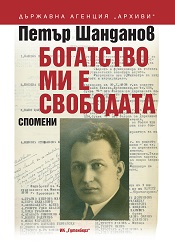
The memories of Petar Shandov are authoritative source about the history of the movements of national-integration for the Bulgarians in Macedonia. During his long and active involvement in this movement Shandov had gathered rich and valuable information about its development, about the controversy and the struggles in it, about the changes of ideas and its evolving and about the figures of that historical period. The chronological range of the memories in this book is form 1908 to 1950. The memories are written in an understandable, enthralling way and are great contribution to the Bulgarian documentations.
More...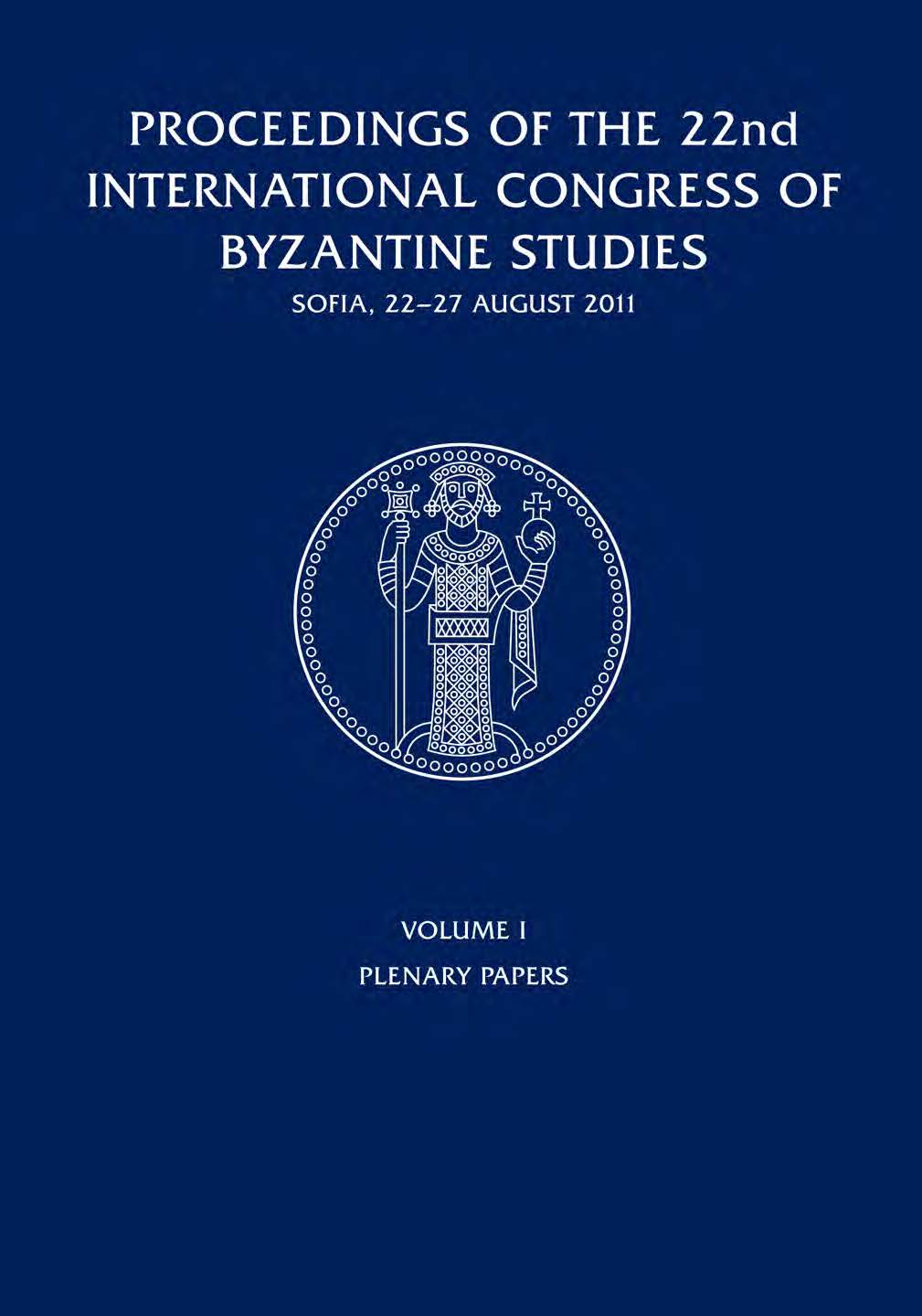
The main theme of the congress, Byzantium without borders, aims at exploring the role of this great empire in the medieval world and its undiminished contemporary significance. Th e Congress program was designed so as to encourage the presentation of research in both traditional and novel areas. Th e participants’ contributions were arranged in seven plenary sessions and more than eighty associated round tables and panels of free communications, displaying an amazing variety of directions of research. All papers, submitted to the Organizing Committee in time, were published in advance and so we have now a fine collection of three volumes, containing the plenary papers, the abstracts of papers for the round-table discussions, as well as the free-communication abstracts.
More...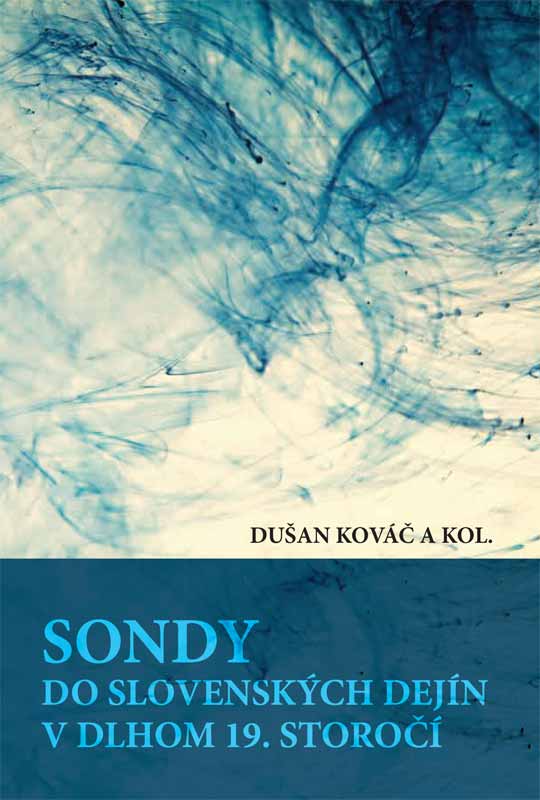
Slovenské politické myslenie je úzko späté so slovenskými politickými programami. V 19. storočí v súvislosti so šírením ideológie nacionalizmu bol politický program dominantný a politické myslenie bolo akýmsi sprievodným javom politického zápasu. Politický program formovala elita národa – jeho politickí a kultúrni predstavitelia – a tá istá elita sa pokúšala svoje idey formulovať v tlači i v samostatných publikáciách.
More...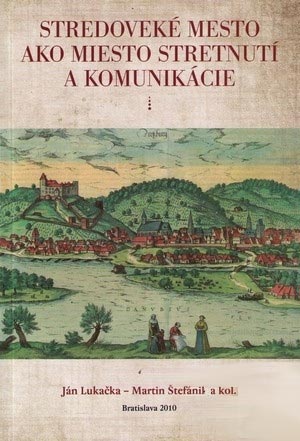
V dramatickém dění, jímž procházely země české koruny v průběhu 15. století, hrála jednu z nejdůležitějších rolí mezi dějinnými aktéry města. Vzestup měst v letech husitských válek vyústil v jejich pevný podíl na zemské politice také v dalších desetiletích. Na zemských sněmech, v landfrídech, při komplikovaných jednáních na panovnickém dvoře, zde všude se setkáváme se zástupci měst, kteří jsou přese všechny stavovské animozity bráni jako důležití partneři v politických jednáních. Nejednalo se přitom jen o velké a rezidenční urbánní lokality, na významu získá- vala též města střední velikosti; a stejně tak nešlo jen o rovinu tzv. „vysoké“ politiky, která je v historických pracích tradičně spojována hlavně s pražským souměstím, nýbrž i o víceméně běžná jednání mezi městy určitého regionu, resp. mezi městy a jejich šlechtickými a církevními sousedy – jedná se pochopitelně o zeměpanská, nikoli poddanská města. Na Moravě se původně silná skupina markraběcích měst zúžila během vlády markraběte Jošta na necelou polovinu, tj. třináct měst, z nichž před polovinou 15. století zůstalo pouhých šest. Mezi nimi i čtyřměstí, které mělo mezi v rámci Moravy přední postavení již v polovině 14. století – Brno, Olomouc, Jihlava a Znojmo. A právě naposled jmenovanému městu a jeho politické aktivitě v padesátých letech 15. století se chceme věnovat.
More...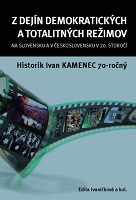
Včase, keď sa po prvej svetovej vojne pripravovala mierová zmluva s porazenými ústrednými mocnosťami, v prvom bode francúzskeho textu memoranda československej vlády o postavení národností v Československu bol vyjadrený zámer formovať organizovanie štátu tak, že sa prijmú „za základ národných práv princípy uplatnené v ústave Švajčiarskej republiky, čiže vytvorí sa z Československej republiky istý druh Švajčiarska, berúc, samozrejme, do úvahy špeciálne podmienky v Čechách“. Pod švajčiarskymi ústavnými princípmi, uplatňovanými s prihliadnutím na špecifické podmienky „Čiech“, sa malo rozumieť všeobecné volebné právo s využitím pomerného systému a jazykové práva národnostných menšín. O štátoprávnej inšpirácii švajčiarskou ústavou sa v memorande nehovorilo nič.
More...
Minister zahraničných vecí Slovenskej republiky Ferdinand Ďurčanský, po oficiálnom uznaní nového štátu zo strany Moskvy, už v novembri 1939 uvažoval o prehĺbení vzájomných stykov otvorením diplomatického zastúpenia. Politické myslenie v Bratislave očividne vítalo slovanskú veľmoc Rusko, ktorá paktom s Nemeckom znova aktívne vstúpila do medzinárodnej politiky a s germánskym partnerom si delí sféry vplyvu. Európska politická tlač „z anglického prameňa (New´s Chronicle a. i.)“, dokonca písala už o vyjednávaní Sovietov so slovenskou vládou, okrem iného aj o zriadení slobodného sovietskeho prístavu v Bratislave. Oficiálny ministerský prípis pre slovenské vyslanectvá však podobné tvrdenia dôrazne popieral. K formálnej stránke medzištátnych stykov sa uvádzalo: slovenský vyslanec Fraňo Tiso zatiaľ neodovzdal svoje poverovacie listiny v Moskve a sovietska vláda ešte nepožiadala o agrément pre svojho zástupcu v Bratislave.
More...
Vkrátkém, na zvraty bohatém a tragicky ukončeném životě Vladimíra Clementise byl jeho pobyt ve Francii od července 1939 do ledna 1940 jen drobnou epizodou, nicméně s dalekosáhlými důsledky. Připomeňme, jak se tehdy sedmatřicetiletý komunista Clementis, zbavený po zákazu KSČ na podzim 1938 mandátu poslance Národního shromáždění pomnichovské Česko-Slovenské republiky, ocitl v Paříži.
More...
Rada svobodného Československa, založená v únoru 1949 jako pokus o zastřešující politický orgán československého exilu, prošla během první poloviny padesátých let fázemi jak konsolidace, tak programových sporů a krizí. Specifickou složku jejích aktivit představovala „zahraniční politika“, v jejíž tvorbě klíčové konceptuální osobnosti představovali Hubert Ripka a v mladší generaci pak Fedor Hodža. Jejich role byla stvrzena i oficiálním pověřením. Hubert Ripka se stal chargé pro záležitosti mezinárodních vztahů a v rámci nové konsolidace orgánů Rady od podzimu 1952 se vedle obnoveného Ripkova pověření stal chargé pro evropské a integrační záležitosti F. Hodža. Jednou ze zásadních rovin sporu uvnitř Rady (stejně tak uvnitř exilových orgánů z ostatních zemí středovýchodní Evropy) znamenal spor o přežilou koncepci „politiky osvobození“. Ta vycházela z představy, že z velkého válečného konfliktu Západ – Východ vzejde mj. znovuosvobození zemí středovýchodní Evropy. H. Ripka proti tomu rozvíjel koncept, v němž (zvláště po zkušenostech s vnitřními tenzemi v Československu a v NDR v roce 1953) stále větší role byla přiřazována vnitřním silám v zemích středovýchodní Evropy a celkově řešení „bez války“. Výsledkem byl koncept „politiky sebeosvobození“.
More...
Zmeny vo vedení KSS, od roku 1953 personálne stabilizovanom, sa v podstate uskutočnili v rokoch 1962 – 1964. Čiastkové, ale nesystémové prebehli už roku 1960, a to zrejme v súvislosti s plánovaným zjazdom KSS roku 1960, ktorý sa však neuskutočnil. Dovtedy totiž platilo, že zjazdy KSS boli každé dva roky, no po celoštátnej konferencii KSČ v júli 1960, ktorá prijala zmenu stanov, sa aj zjazdy KSS konali raz za štyri roky, podobne ako zjazdy KSČ. Rozhodujúcim rokom zmien sa preto stal rok 1963, keď nastalo „kádrové zemetrasenie“, predovšetkým v dôsledku vynúteného prehodnotenia politických procesov z prvej polovice 50. rokov. Roku 1964 tieto zmeny určitým spôsobom doznievali. Ich výsledkom bolo de facto nové vedenie KSS, z ktorého síce odišla „stará“ alebo „gottwaldovská garda“, no o jeho novej politike nemožno ešte vonkoncom hovoriť. Noví vedúci funkcionári boli síce generačne mladší, ale politicky diferencovanejší, čo sa vo vnútropolitickej situácii ukázalo až neskôr, v druhej polovici 60. rokov.
More...
Keď sa v súčasnosti, štyridsať rokov po udalostiach spätých s rokom 1968 zamýšľame nad ich významom v dejinách, a to nielen slovenských a československých, dospejeme k názoru, že procesy, ktoré sa udiali v podstate v priebehu niekoľkých týždňov počas jarných mesiacov toho pamätného roka, mali korene v hlbšej minulosti. V zásade súviseli s geopolitickým výsledkom druhej svetovej vojny, ktorý znamenal začlenenie nášho regiónu do sovietskej sféry vplyvu. Dnes už s istotou vieme, že o budúcnosti povojnového Československa sa rozhodlo na konci druhej svetovej vojny. Jeho vtedajším obyvateľom politici ponúkali viacero možností ďalšieho napredovania obnoveného československého štátu. Niektorí očakávali návrat ku klasickej liberálnej kapitalistickej spoločnosti, iní boli presvedčení o tom, že práve v regióne strednej Európy je možné budovať akúsi spoločnosť „mostov“, ktorá v sebe spojí výhody trhovej ekonomiky, demokracie s možnosťami istého centrálneho plánovania. Komunisti zasa sľubovali budovanie sociálne spravodlivej spoločnosti, aplikovanie údajne vedeckej teórie marxizmu-leninizmu a výlučne plánované hospodárstvo. To bol jediný spôsob, ktorým sa malo podľa nich zabrániť takým veľkým krízam, akou bola napr. veľká hospodárska kríza na začiatku 30. rokov dvadsiateho storočia. Trauma z dopadov tejto krízy nesporne zohrávala svoju úlohu i v čase, keď na jar 1946 v relatívne slobodných voľbách získala KSČ v celoštátnom meradle 37,94 % hlasov (v českých krajinách dokonca 40,17 %). Aj v súčasnosti sa k nej historici vracajú, keď uvažujú o príčinách, ktoré viedli voličov v českej časti republiky k tomu, že vo voľbách dali prednosť komunistickej strane.
More...
Vtransformácii slovenskej spoločnosti po novembri 1989 zohralo dôležitú úlohu skoncipovanie a schválenie základného právneho dokumentu – ústavy. Mala byť zavŕšením slovenskej štátnosti, ktorú komunistický režim v predchádzajúcich dvadsiatich rokoch nedokázal realizovať so všetkými atribútmi.
More...
Prieskumy verejnej mienky v stredoeurópskych, tzv. postkomunistických krajinách ukazujú, že väčšina obyvateľov týchto krajín je presvedčená, že žije v štandardných demokratických podmienkach. Hlavným argumentom pre štandardnú demokraciu je existencia pluralitného spektra politických strán a všeobecné volebné právo.
More...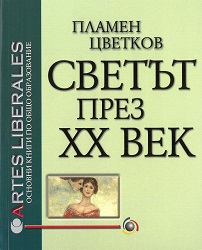
Ignorance towards world history can lead to severe distortions in the national psyche. Even today, Bulgarians either rejoice as the greatest nation, surrounded by enemies, for some reason, or as a hopelessly lagging nation. The book offers the most fateful events and processes from the history of mankind in the twentieth century. During this century, people entered space, found the computer but at the same time faced the threat of nuclear self-destruction and were struck by a new type of plague known as AIDS. The planet became narrow. Clothing, life-style and food are uniform. The globalization, symbolized by both McDonald's fast food and Chinese restaurants, has its furious opponents, but also enthusiastic followers. Current Handbook aims to acquaint students with those historical events and processes in the history of Europe and the world in the twentieth century that directly impact human civilization, and the beginning of the 21st century. Therefore, the approach is not typical for historical science - events and processes are not chronologically but problem-based considered.
More...